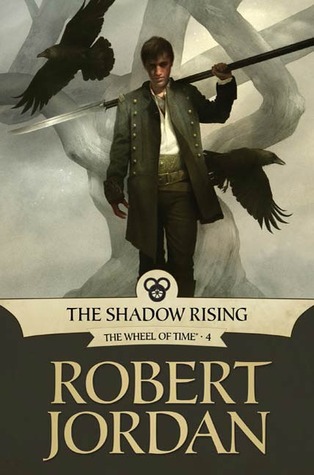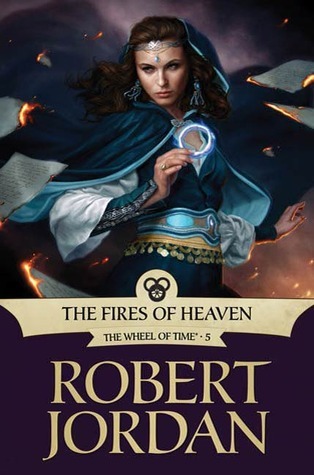Since then, Robert Jordan wrote half a dozen more books and, sadly, died before completing his fantasy masterpiece. His wife and his publisher worked together to find another writer, Brandon Sanderson, to use Jordan's notes and outlines to complete the final book (which, naturally, turned into three final books). When the last book was published earlier this year, the series had swollen to 14 massive books and one shorter prequel book. I FINALLY finished reading the last book earlier this week.
I have a love-hate relationship with The Wheel of Time. I do enjoy it, after all. Robert Jordan was a good writer. The stories were undeniably drawn out, but the first few were put together well and kept you going. The writing style was a nice balance between modern (easier for modern readers to read) and a more sort of formal style reminiscent of Tolkien. This style relaxed more toward modern in the latter books, and by Brandon Sanderson's day, was very relaxed indeed. What follows is a lot of frustration and criticism, so I want to reiterate before I get into it that I did genuinely enjoy The Wheel of Time and I have a lot of appreciation for the sheer ambition of the series. Robert Jordan tried to cover just about everything that can be covered in fantasy in this series, and he did it very well in many cases.
The major problem is the pacing. There is simply no reason for the ridiculous length of the series. With some basic tightening (maybe a little less skirt-smoothing, sniffing, braid tugging, beard scratching, etc.) this could have been condensed into about half as many very exciting and action-packed books. The amount of repetition is staggering. We are told (exhaustively) about every thought, relevant or not, that goes through the characters' heads. We are told this over and over and over again. Once you pick up the pattern, it's easy to just skip these parts. "Yes thank you for sharing your feelings OKAY STFU."
The other issue that's often cited, that I happen to agree with, is the problem of how the women are written. On the surface, there are tons of really strong female characters who have a lot of worldly power. They are magic-users, queens, warriors, merchants, innkeepers. They are often in charge. Great! However, they are all the same character, and it's one that doesn't bear any resemblance to any woman I've ever met. It's mind boggling. Egwene is his best stab at a good female character who actually develops throughout the story, and I do like Moiraine, but so many of them are downright annoying. I think that Robert Jordan thought to himself, "I'm going to fill this story with Strong Female Characters and the ladies will love it!" He went heavy on the Strong in a literal way, but that's as far as he got in most cases.
There's also the fact that every single character seems to spend about half of their time ruminating on the differences between men and women, giving idiotic advice on such, and being mystified at the actions of the opposite sex.
There's also the fact that every single character seems to spend about half of their time ruminating on the differences between men and women, giving idiotic advice on such, and being mystified at the actions of the opposite sex.
I did enjoy these books, but especially during the middle ones, I couldn't help but wonder how much better they would be without the annoying, repetitious character quirks. Seriously, I really only need to be told once that Mat is a scoundrel, or that Perrin likes to move and think deliberately. You don't have to tell me in every other paragraph in every single one of that character's POV chapters! And if I read one more description of "Aes Sedai calm," I'm going to scream. In fact, Brandon Sanderson (deliberately?) has an Aes Sedai character use these very words to a fellow Aes Sedai after she's been through a very traumatic experience: "You're not going to be able to maintain your Aes Sedai calm, so be careful," or something close to that. It wasn't a moment to laugh, but I laughed.
It's easy to see that I was often very frustrated at these books, but I very much enjoy many parts of them, and in the last three books, Brandon Sanderson picks up the pace considerably. The writing was rougher, and I had the sense that he was going down a list of plot points to resolve. It felt a little like a first draft. But it was satisfying and I didn't really mind.
If you're a reader of fantasy fiction and you haven't read The Wheel of Time, I think your question at this point would be: Is it worth it to read this? Knowing in advance that the work is magnificent but seriously flawed, is it worth the hundreds of hours that it will take to read these books?
That is a hard question to answer. I'm not entirely sure that it is. There are so many really excellent choices out there when it comes to fantasy fiction. If you've read some of these books but fell off the wagon in the middle, I recommend reading wikis of the middle books and then resuming with Knife of Dreams. It does get better. If you're new to fantasy fiction, I would look elsewhere, to be honest. If you're widely read in epic fantasy but somehow haven't read these yet, they're certainly worth a try.
Side note: I've illustrated this post with cover art from the ebooks editions. The mass market paperback editions on my shelves have the old Darrell K. Sweet artwork, which I do not care for. I much prefer the ebook versions, each of which is by a different artist. Those above are two of my favorite characters, Mat and Moiraine, and of course here's the final book, which is painted by my favorite fantasy artist, Michael Whelan. Sadly, Darrell K. Sweet actually passed away before he finished the painting for A Memory of Light, which means this series outlived both its author and its principal artist.
Side note: I've illustrated this post with cover art from the ebooks editions. The mass market paperback editions on my shelves have the old Darrell K. Sweet artwork, which I do not care for. I much prefer the ebook versions, each of which is by a different artist. Those above are two of my favorite characters, Mat and Moiraine, and of course here's the final book, which is painted by my favorite fantasy artist, Michael Whelan. Sadly, Darrell K. Sweet actually passed away before he finished the painting for A Memory of Light, which means this series outlived both its author and its principal artist.




No comments:
Post a Comment